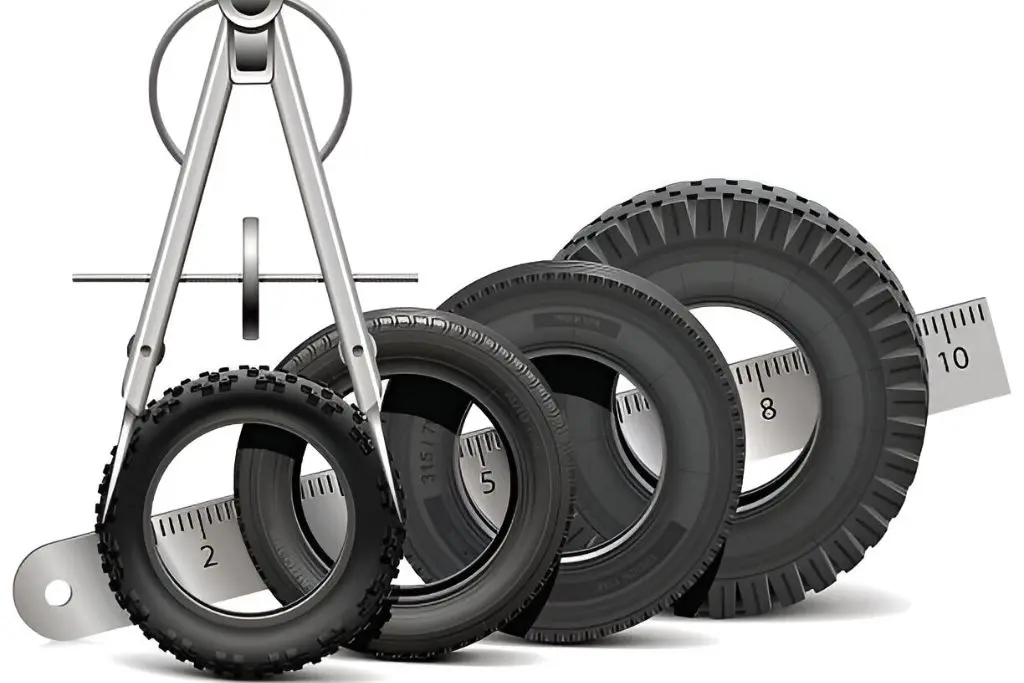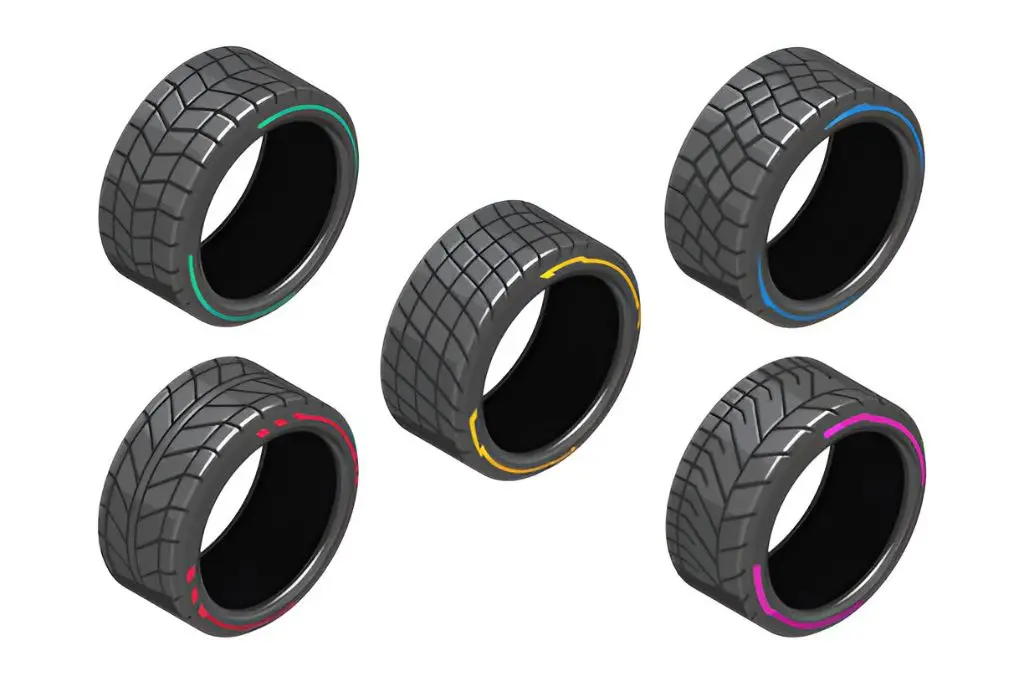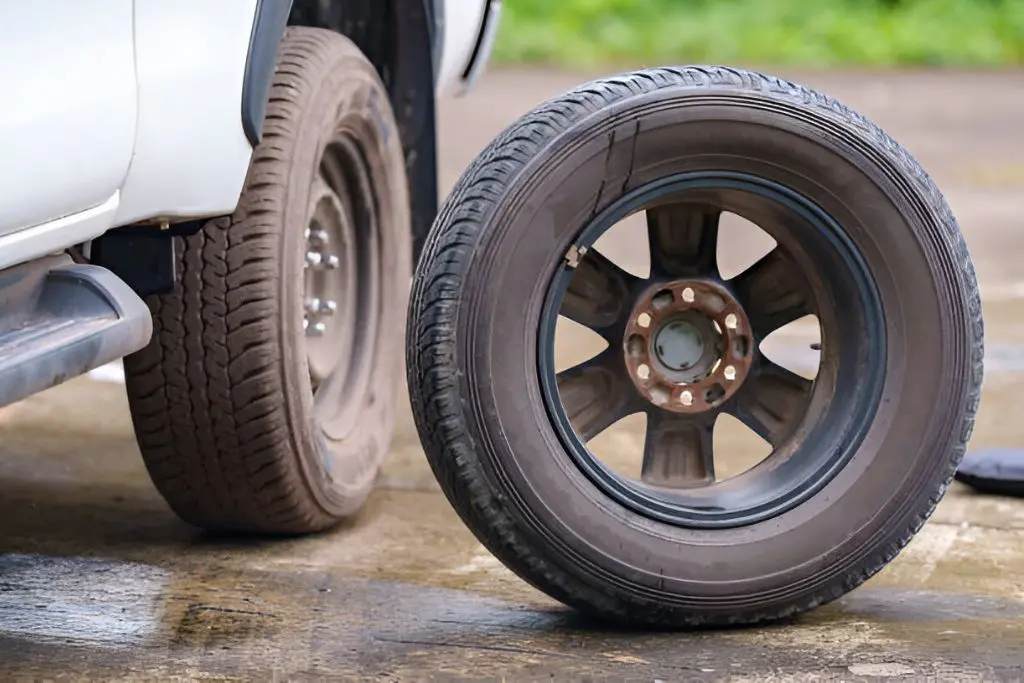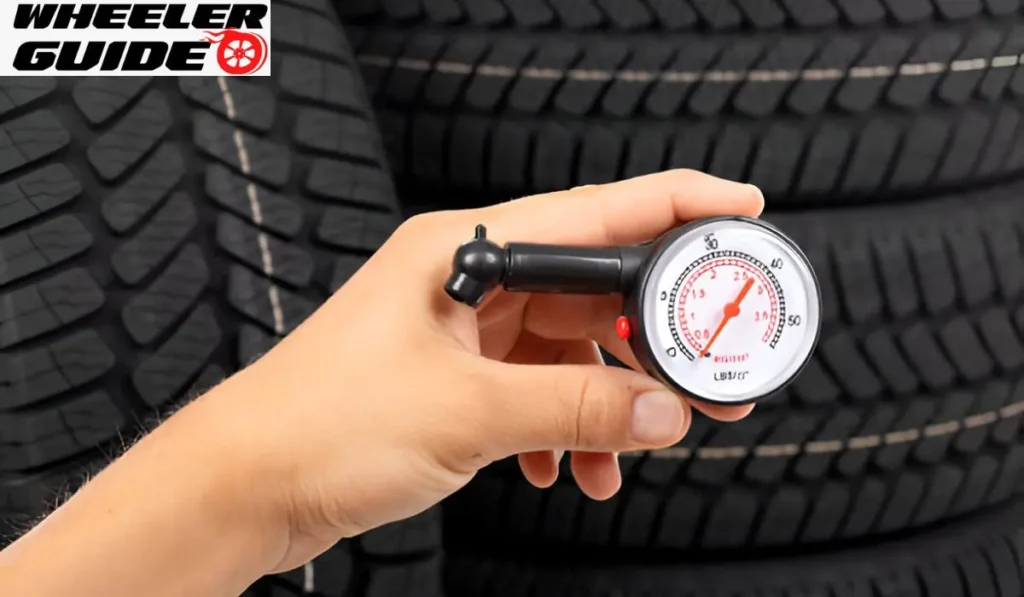Auto tires are important to every single car, but for many years, you thought of what tire operation excess weight they unquestionably weigh upon scales? The weight of a tire directly helps in the performance, fuel efficiency, handling and many other prospects.
Without the rim, the average weight of a car tire is 20 to 30 pounds. The amount of weight you can tow depends in part on the size and type of tire, and how it is built. A passenger tire, for instance, may weigh 15- pounds to start with whereas other ones can reach the 30-pound or more mark.
Notice that the wheel assembly would have a greater total weight because of that heavy rim! An entire car wheel (tire and rim) can weigh about 60 lbs. Such weight can significantly contribute to a vehicle’s overall performance and fuel efficiency.
- Fundamentals of Tire Weight
- Factors Affecting the Weight of Car Tires
- Average Weight of Different Types of Car Tires
- Why Knowing Tire Weight is Important
- How to Determine the Weight of Your Car Tire
- Weight Differences Among Tire Types
- Tips for Choosing the Right Tire Weight for Your Car
- What is the Standard Weight Range for a Car Tire?
- Do All-Season and Winter Tires Weigh the Same?
- How to Check the Weight of a Tire Before Purchase
- How to Choose a Lightweight Tire for Better Handling
- Frequently Asked Questions
Fundamentals of Tire Weight
Tire weight varies based on several key factors. The size of a tire plays a big role in how much it weighs.
Size and Weight Relationship
Tire size significantly influences weight. Wider tires and those with a larger diameter tend to weigh more. This is because they use more materials in their construction. A typical passenger car tire weighs about 20 pounds without the rim. But this can change based on the specific size and type of tire. Larger tires, like those for trucks or SUVs, can weigh much more. Some may reach 80 pounds or higher. The weight difference between sizes can be substantial. For example, a small car tire might weigh 15 pounds, while a large truck tire could weigh over 100 pounds. Tire makers use different materials and designs for various sizes. This affects the final weight of each tire model.
Factors Affecting the Weight of Car Tires
Five Factors That Determine Car Tire Weight One of the main things to consider is its construction material. The construction types such as steel-belted, radial, and bias-ply each offer a different weight mass, so the size dimensions of these components become another variable to consider when determining overall tire weight. Therefore its width, aspect ratio, and diameter all affect how heavy the tire is. Bigger tires are heavier overall. From a tire weight point of view, the tread design and depth that you choose will also make a difference. Deeper treaded And more complicated patterned tires will be heavier than the simpler treaded ones. How the tire is intended to be used will also dictate its weight. As performance tires, off-road tires, winter tires, and all-season tires are each designed for different applications, they have different weight characteristics.
Here’s a simple breakdown of average tire weights by vehicle type:
- Passenger cars: 20-30 lbs
- SUVs and light trucks: 30-50 lbs
- Commercial trucks: 50-80+ lbs
It’s important to note that these weights are for tires without rims. The total wheel assembly weight can be significantly higher when the rim is included.

Average Weight of Different Types of Car Tires
Passenger Car Tires: 15-27 Pounds
Passenger car tires typically weigh between 15 to 27 pounds without the rim. These tires are designed for everyday use, balancing comfort and durability.
SUV Tires: 30-50 Pounds
SUV tires are generally heavier than passenger car tires, weighing between 30 to 50 pounds. They are built to support the extra weight and larger dimensions of SUVs, ensuring better traction and stability.
Truck Tires: 50-80 Pounds
Truck tires can weigh significantly more, ranging from 50 to 80 pounds. These tires are constructed to handle heavy loads and rough terrains, making them more robust and larger.
Performance Tires: 15-25 Pounds
Performance tires are specifically designed to be lighter, usually weighing between 15 to 25 pounds. Their reduced weight enhances vehicle speed and handling, providing a sportier driving experience.
All-Terrain Tires: 35-65 Pounds
All-terrain tires are built for rugged environments, with weights ranging from 35 to 65 pounds. Their reinforced structure makes them heavier, ensuring durability and traction on off-road surfaces.

Factors Influencing Tire Weight
The weight of a tire depends on factors such as its size, material composition, and intended use. Tires with a higher load index or deeper tread patterns typically weigh more due to additional rubber and reinforcements.
Why Tire Weight Matters
Choosing the right tire weight can affect fuel efficiency, vehicle handling, and overall performance. Understanding these variations can help you make informed decisions when selecting the best tire for your vehicle.

Why Knowing Tire Weight is Important
Weight of the Tires How a Car Drives Tires that are heavier will cause the car to use more gas, while lighter tires will do the opposite. This is because the engine has to work more to drag the additional weight. Since tires are unsprung weight, a lighter tire will help the car go faster and stop better. It also helps to go when making a turn. These things all combine to make driving safer and more enjoyable. Heavy tires can lead to faster wear on other parts of the car. They weigh on the suspension more and harm the wheel alignment. Eventually, this results in expensive repairs.
When buying new tires, weight is an important factor to think about. Lighter tires might cost more upfront, but they can save money on gas and repairs later. For race cars and high-end sports cars, every pound counts. Engineers work hard to make tires as light as possible without losing strength or grip. Knowing tire weight helps drivers make smart choices. It can improve how the car drives, save money and keep the car in good shape for longer.

How to Determine the Weight of Your Car Tire
There are a few ways in which you can find out how much your car tire weighs. Well, here I will share with you some easy ways to retrieve this information. Check the tire’s sidewall. You will be shown a code with numbers and letters. This hash can show you information on the tire’s size, or even weight. Search for your tire online. A lot of tire manufacturers host sites that allow you to throw info into a field. They almost always put their weight there. You can weigh the tire yourself if you have a bathroom scale at home. Place the tire on the scale and record the figure as it reads. Again, this involves the rim as well.
For a more exact weight, go to a tire shop. They have special scales that can weigh just the tire without the rim. The tire’s load index can also help. It’s a number on the sidewall that shows how much weight the tire can hold. A higher number means a heavier tire.
Here’s a quick guide to load index numbers:
| Load Index | Max Weight (lbs) |
| 75 | 852 |
| 80 | 992 |
| 85 | 1135 |
These methods can help you find out how much your car tire weighs. Knowing this can be useful when you need to replace tires or check your car’s total weight.

Weight Differences Among Tire Types
Car tires come in various types, each with unique weight characteristics. The average car tire weighs between 15-27 pounds, but this can vary significantly based on the tire’s purpose and design. All-season tires typically weigh less than winter tires. Winter tires have deeper treads and special rubber compounds, adding to their weight. This extra heft helps with traction in snow and ice. Run-flat tires are heavier than standard tires. They have reinforced sidewalls to support the vehicle’s weight when deflated. This added structure increases the tire’s overall mass. Specialty tires for mud or snow conditions often weigh more than regular tires. Their aggressive tread patterns and durable construction contribute to the increased weight. This extra bulk improves traction in challenging terrain.
Here’s a quick comparison of tire weights:
| Tire Type | Average Weight Range |
| All-Season | 20-25 lbs |
| Winter | 25-30 lbs |
| Run-Flat | 30-35 lbs |
| Mud/Snow | 35-45 lbs |
Truck tires can weigh significantly more, ranging from 30 to 80 pounds. The weight difference impacts fuel efficiency and handling. Heavier tires require more energy to rotate, potentially reducing gas mileage.

Tips for Choosing the Right Tire Weight for Your Car
Check Recommended Tire Specs
Look at your owner’s manual or the door jamb placard for the recommended tire size and specifications.
Consider Driving Needs
Lighter tires improve fuel efficiency and handling, while heavier tires offer better traction and durability for larger vehicles.
Know the Average Tire Weight
The average car tire weighs 15-27 pounds, while SUV and truck tires are typically heavier.
Pay Attention to Load Ratings
Load ratings show how much weight a tire can safely carry. Make sure to match this with your vehicle’s requirements.
Factor in Climate Conditions
Snow tires are heavier for better grip, while all-season tires offer a balance for year-round use.
Align with Performance Goals
Lighter tires enhance acceleration and braking, while heavier ones provide a smoother ride.
Consult a Tire Professional
A professional can help match tire weight to your specific vehicle and driving habits.
Maintain Proper Tire Care
Regular rotations and pressure checks ensure even wear and optimal performance.

What is the Standard Weight Range for a Car Tire?
Car tires come in various sizes and weights. The average car tire weighs between 20 to 30 pounds without the rim. This weight can change based on the tire’s size and type. Smaller car tires usually weigh less. They might be around 20 pounds. Larger tires for bigger cars can weigh up to 30 pounds or more.
Some factors that affect tire weight include:
- Tire size
- Tread pattern
- Internal construction
- Materials used
It’s important to note that these weights are for the tire alone. The rim adds extra weight, which can vary depending on its material and size. Truck tires are typically heavier, ranging from 30 to 80 pounds. This is due to their larger size and need to support more weight.
Knowing a tire’s weight is useful for several reasons:
- Calculating fuel efficiency
- Determining vehicle load capacity
- Planning for tire transport or storage
The tire load index is also important. It shows how much weight each tire can safely support. This number is crucial for selecting the right tires for a vehicle.

Do All-Season and Winter Tires Weigh the Same?
All-season and winter tires are often of a different weight as well. It is because of their one-off built designs and specific purposes. Otherwise, all-season tires weigh in at a massive 20 to even 30 lbs, and that is before the rim. Meant to reach high performance in all seasons On the other hand, winter tires are generally heavier. On average, they weigh around 23 pounds. Their additional weight stems from their uniqueness. This compensates that in basic winter tires, the tread blocks are more robust of performance winter ones both through deeper treads and extra siping. This would provide some grip on snow and ice. The rubber-compound winter tires are also different.
It stays more flexible in cold temperatures. This allows for a better grip on icy roads. These features add to the tire’s overall weight. The weight difference between all-season and winter tires is not huge. But it can be noticeable when changing tires for the season. It’s important to note that tire weights can vary. Factors like size and brand can affect the final weight. Always check the specific tire’s specifications for exact weights.
How to Check the Weight of a Tire Before Purchase
Checking a tire’s weight before buying can be helpful. Here are some easy ways to do this:
- Look at the tire’s sidewall. The weight is often listed there along with other specs.
- Check the manufacturer’s website. Most tire makers list weights for their products online.
- Ask the tire shop. Staff can usually find the weight info quickly.
- Use a bathroom scale. If the tire is already off the rim, you can weigh it directly.
Keep in mind that tire weight can vary based on size and type. Car tires typically weigh 20 to 30 pounds, while truck tires are heavier.
It’s good to compare the weights of similar tires. This can help you pick the best option for your needs. Remember, lighter tires often improve fuel economy. However, heavier tires may last longer in some cases. When checking tire weight, also look at other key features. These include tread pattern, speed rating, and load capacity.
How to Choose a Lightweight Tire for Better Handling
Picking lightweight tires can boost your car’s handling. Lighter tires mean less weight for the engine to move. This leads to better fuel economy and quicker acceleration. When shopping for lightweight tires, look at the tire’s weight rating. Many brands list this info on their websites or product labels. Aim for tires that weigh less than 30 pounds each.
Tire size matters too. Smaller tires tend to weigh less. But don’t go too small – make sure the tire fits your wheel and can support your car’s weight.
Material is key for lightweight tires. Look for options made with:
- High-silica compounds
- Kevlar reinforcement
- Carbon fiber elements
These materials cut weight without losing strength.
Less material is needed in the construction of low-profile tires, which have lower weights and often result in shorter sidewalls. These can enhance handling but may provide a more rigid ride. Always keep in mind that safety is more important than performance. Daily driving should not be the target use of ultra-light racing tires. Access the tires that meet your car’s load requirements and offer great traction. Do your homework and. Refer to the manual for your car or, failing that, speak to a tire pro to make sure your lightweight tire choice will be safe and fit properly. This allows you to have more control without sacrificing security.
Frequently Asked Questions
What is the average weight of a passenger vehicle tire?
The average car tire weighs about 27 pounds. Compact car tires may weigh slightly less, while larger SUV tires can weigh more.
What factors affect the weight of a car tire?
Tire size and construction affect weight. Wider and taller tires weigh more, and specialised winter or performance tires tend to be heavier than all-season tires.
How is tire weight related to tire size, such as 17-inch tires?
Larger tires typically weigh more. A 17-inch tire usually weighs more than a 15-inch tire due to the extra rubber and materials used.
Can the weight of a tire differ with and without the rim?
Yes, the rim adds significant weight. A car rim can add around 30 pounds, making the combined weight of a tire and rim around 60 pounds for passenger vehicles.
What is the typical weight range for truck tires including the rim?
Truck tires without the rim weigh 30 to 80 pounds. With the rim, they can weigh over 100 pounds, depending on the truck’s size and purpose.
How can you calculate the weight of a tire based on its specifications?
Tire weight can be estimated using its dimensions. Manufacturers often provide weight details, but a rough estimate can be made using width, height, and diameter.


